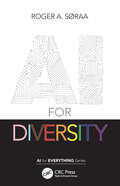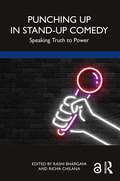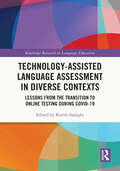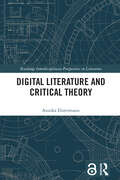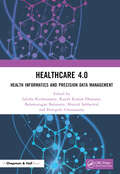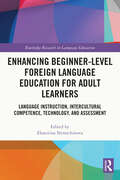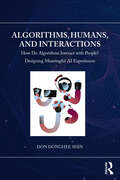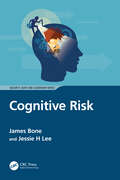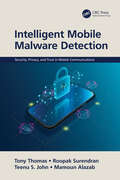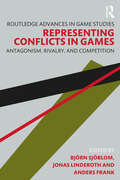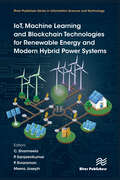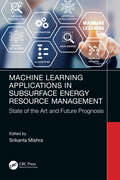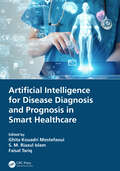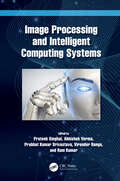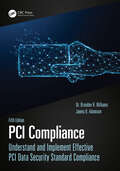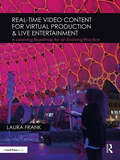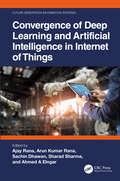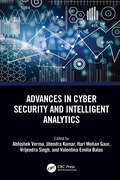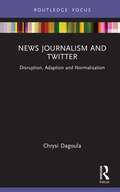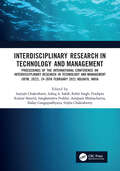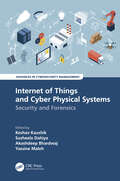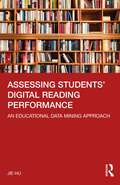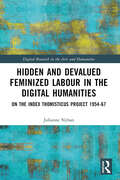- Table View
- List View
AI for Diversity (AI for Everything)
by Roger A. SøraaArtificial intelligence (AI) is increasingly impacting many aspects of people’s lives across the globe, from relatively mundane technology to more advanced digital systems that can make their own decisions. While AI has great potential, it also holds great peril depending on how it is designed and used. AI for Diversity questions how AI technology can lead to inclusion or exclusion for diverse groups in society. The way data is selected, trained, used, and embedded into societies can have unfortunate consequences unless we critically investigate the dangers of systems left unchecked, and can lead to misogynistic, homophobic, racist, ageist, transphobic, or ableist outcomes. This book encourages the reader to take a step back to see how AI is impacting diverse groups of people and how diversity-awareness strategies can impact AI.
Punching Up in Stand-Up Comedy: Speaking Truth to Power
by Rashi Bhargava Richa ChilanaPunching Up in Stand-Up Comedy explores the new forms, voices and venues of stand-up comedy in different parts of the world and its potential role as a counterhegemonic tool for satire, commentary and expression of identity especially for the disempowered or marginalised. The title brings together essays and perspectives on stand-up and satire from different cultural and political contexts across the world which raise pertinent issues regarding its role in contemporary times, especially with the increased presence of OTT platforms and internet penetration that allows for easy access to this art form. It examines the theoretical understanding of the different aspects of the humour, aesthetics and politics of stand-up comedy, as well as the exploration of race, gender, politics and conflicts, urban culture and LGBTQ+ identities in countries such as Indonesia, Finland, France, Iran, Italy, Morocco, India and the USA. It also asks the question whether, along with contesting and destabilising existing discursive frameworks and identities, a stand-up comic can open up a space for envisaging a new social, cultural and political order? This book will appeal to people interested in performance studies, media, popular culture, digital culture, sociology, digital sociology and anthropology, and English literature.
Technology-Assisted Language Assessment in Diverse Contexts: Lessons from the Transition to Online Testing during COVID-19 (Routledge Research in Language Education)
by Karim SadeghiThis timely collection explores the role of digital technology in language education and assessment during the COVID-19 pandemic. It recognises the unique pressures which the COVID-19 pandemic placed on assessment in language education, and examines the forced shift in assessment strategies to go online, the existing shortfalls, as well as unique affordances of technology-assisted L2 assessment. By showcasing international examples of successful digital and computer-assisted proficiency and skills testing, the volume addresses theoretical and practical concerns relating to test validity, reliability, ethics, and student experience in a range of testing contexts. Particular attention is given to identifying lessons and implications for future research and practice, and the challenges of implementing unplanned computer-assisted language assessment during a crisis. Insightfully unpacking the ‘lessons learned’ from COVID and its impact on the acceleration of the shift towards online course and assessment delivery, it offers important guidelines for navigating assessment in different instructional settings in times of crisis. It will appeal to scholars, researchers, educators, and faculty with interests in educational measurement, digital education and technology, and language assessment and testing.
Digital Literature and Critical Theory (Routledge Interdisciplinary Perspectives on Literature)
by Annika ElstermannThe aim at the core of this book is a synthesis of increasingly popular and culturally significant forms of digital literature on the one hand, and established literary and critical theory on the other: reading digital texts through the lens of canonical theory, but also reading this more traditional theory through the lens of digital texts and related media. In a field which has often regarded the digital as apart from traditional literature and theory, this book highlights continuities in order to analyse digital literature as part of a longer literary tradition. Using examples from social media to video games and works particularly by postmodern and poststructuralist theorists, Digital Literature and Critical Theory contextualises digital forms among their analogue precursors and traces ongoing social developments which find expression in these cultural phenomena, including power dynamics between authors and readers, the individual in (post-)modernity, consumerism, and the potential for intersubjective exchange.
Healthcare 4.0: Health Informatics and Precision Data Management (Healthcare Technologies Ser.)
by Balamurugan Balusamy Rajesh Kumar Dhanaraj Munish Sabharwal Lalitha Krishnasamy Poongodi ChinnasamyThe main aim of Healthcare 4.0: Health Informatics and Precision Data Management is to improve the services given by the healthcare industry and to bring meaningful patient outcomes, Informatics involved by applying the data, information and knowledge in the healthcare domain. Features: Improving the quality of health data of a patient A wide range of opportunities and renewed possibilities for healthcare systems Gives a way for carefully and meticulously tracking the provenance of medical records Accelerating the process of disease oriented data and medical data arbitration To bring the meaningful patient health outcomes To eradicate the delayed clinical communications To help the research intellectuals to step down further towards the disease and clinical data storage. Creating more patient-centered services The precise focus of this handbook will be on the potential applications and use of data informatics in area of healthcare, including clinical trials, tailored ailment data, patient and ailment record characterization and health records management.
Enhancing Beginner-Level Foreign Language Education for Adult Learners: Language Instruction, Intercultural Competence, Technology, and Assessment (Routledge Research in Language Education)
by Ekaterina NemtchinovaThis book is an authoritative text that explores best classroom practices for engaging adult learners in beginner-level foreign language courses. Built around a diverse range of international research studies and conceptual articles, the book covers four key issues in teaching language to novice students: development of linguistic skills; communicative, and intercultural competence; evaluation and assessment; and the use of technology. Each chapter includes teaching insights that are supported by critical research and can be practically applied across languages to enhance instructional strategies and curriculum designs. The text also aims to build intercultural competence, harness technology, and design assessment to stimulate effective learning in formal instructional settings including colleges, universities, and specialist language schools. With its broad coverage of language pedagogy at the novice level, this book is a must read for graduate students, scholars, researchers, and practitioners in the fields of language education, second language acquisition, language teaching and learning, and applied linguistics.
Algorithms, Humans, and Interactions: How Do Algorithms Interact with People? Designing Meaningful AI Experiences
by Don Donghee ShinAmidst the rampant use of algorithmization enabled by AI, the common theme of AI systems is the human factor. Humans play an essential role in designing, developing, and operationalizing AI systems. We have a remit to ensure those systems run transparently, perform equitably, value our privacy, and effectively fulfill human needs. This book takes an interdisciplinary approach to contribute to the ongoing development of human–AI interaction with a particular focus on the "human" dimension and provides insights to improve the design of AI that could be genuinely beneficial and effectively used in society. The readers of this book will benefit by gaining insights into various perspectives about how AI has impacted people and society and how it will do so in the future, and understanding how we can design algorithm systems that are beneficial, legitimate, usable by humans, and designed considering and respecting human values. This book provides a horizontal set of guidelines and insight into how humans can be empowered by making choices about AI designs that allow them meaningful control over AI. Designing meaningful AI experiences has garnered great attention to address responsibility gaps and mitigate them by establishing conditions that enable the proper attribution of responsibility to humans. This book helps us understand the possibilities of what AI systems can do and how they can and should be integrated into our society.
Cognitive Risk (Security, Audit and Leadership Series)
by James Bone Jessie H LeeCognitive Risk is a book about the least understood but most pervasive risk to mankind – human decision-making. Cognitive risks are subconscious and unconscious influence factors on human decision-making: heuristics and biases. To understand the scope of cognitive risk, we look at case studies, corporate and organizational failure, and the science that explains why we systemically make errors in judgment and repeat the same errors. The book takes a multidisciplinary and pedestrian stroll through behavioral science with a light touch, using stories to explain why we consistently make cognitive errors that not only increase risks but also simultaneously fail to recognize these errors in ourselves or our organizations. This science has deep roots in organizational behavior, psychology, human factors, cognitive science, and behavioral science all influenced by classic philosophers and enabled through advanced analytics and artificial intelligence. The point of the book is simple. Humans persist with bounded rationality, but as the speed of information, data, money, and life in general accelerates, we will need the right tools to not only keep pace but to survive and thrive. In light of all these factors that complicate risk, the book offers a foundational solution. A cognitive risk framework for enterprise risk management and cyber security. There are five pillars in a cognitive risk framework with five levels of maturity, yet there is no universally prescribed maturity level. It is more a journey of different paths. Each organization will pursue its own path, but the goal is the same – to minimize the errors that could have been avoided. We explain why risks are hard to discuss and why we systematically ignore the aggregation of these risks hidden in collective decision-making in an organization. The cognitive risk framework is a framework designed to explore the two most complex risks organizations face: uncertainty and decision-making under uncertainty. The first pillar is cognitive governance, which is a structured approach for institutionalizing rational decision-making across the enterprise. Each pillar is complimentary and builds on the next in a succession of continuous learning. There is no endpoint because the pillars evolve with technology. Enterprise risk is a team effort in risk intelligence grounded in a framework for good decision-making. We close with a call to become designers of risk solutions enabled by the right technology and nurtured by collaboration. We hope you enjoy the book with this context.
Intelligent Mobile Malware Detection (Security, Privacy, and Trust in Mobile Communications)
by Tony Thomas Mamoun Alazab Roopak Surendran Teenu S. JohnThe popularity of Android mobile phones has caused more cybercriminals to create malware applications that carry out various malicious activities. The attacks, which escalated after the COVID-19 pandemic, proved there is great importance in protecting Android mobile devices from malware attacks. Intelligent Mobile Malware Detection will teach users how to develop intelligent Android malware detection mechanisms by using various graph and stochastic models. The book begins with an introduction to the Android operating system accompanied by the limitations of the state-of-the-art static malware detection mechanisms as well as a detailed presentation of a hybrid malware detection mechanism. The text then presents four different system call-based dynamic Android malware detection mechanisms using graph centrality measures, graph signal processing and graph convolutional networks. Further, the text shows how most of the Android malware can be detected by checking the presence of a unique subsequence of system calls in its system call sequence. All the malware detection mechanisms presented in the book are based on the authors' recent research. The experiments are conducted with the latest Android malware samples, and the malware samples are collected from public repositories. The source codes are also provided for easy implementation of the mechanisms. This book will be highly useful to Android malware researchers, developers, students and cyber security professionals to explore and build defense mechanisms against the ever-evolving Android malware.
Representing Conflicts in Games: Antagonism, Rivalry, and Competition (Routledge Advances in Game Studies)
by Jonas Linderoth Anders Frank Björn SjöblomThis book offers an overview of how conflicts are represented and enacted in games, in a variety of genres and game systems. Games are a cultural form apt at representing real world conflicts, and this edited volume highlights the intrinsic connection between games and conflict through a set of theoretical and empirical studies. It interrogates the nature and use of conflicts as a fundamental aspect of game design, and how a wide variety of conflicts can be represented in digital and analogue games. The book asks what we can learn from conflicts in games, how our understanding of conflicts change when we turn them into playful objects, and what types of conflicts are still not represented in games. It queries the way games make us think about armed conflict, and how games can help us understand such conflicts in new ways. Offering a deeper understanding of how games can serve political, pedagogical, or persuasive purposes, this volume will interest scholars and students working in fields such as game studies, media studies, and war studies.
IoT, Machine Learning and Blockchain Technologies for Renewable Energy and Modern Hybrid Power Systems
by P. Sanjeevikumar P. Sivaraman C. Sharmeela Meera JosephThis edited book comprises chapters that describe the IoT, machine learning, and blockchain technologies for renewable energy and modern hybrid power systems with simulation examples and case studies. After reading this book, users will understand recent technologies such as IoT, machine learning techniques, and blockchain technologies and the application of these technologies to renewable energy resources and modern hybrid power systems through simulation examples and case studies.
Chinese Animated Film and Ideology, 1940s-1970s: Fighting Puppets (Focus Animation Ser.)
by Olga BobrowskaThis book examines animated propaganda produced in mainland China from the 1940s to the 1970s. The analyses of four puppet films demonstrate how animation and Maoist doctrine became tightly but dynamically entangled. The book firstly contextualizes the production conditions and ideological contents of The Emperor’s Dream (1947), the first puppet film made at the Northeast Film Studio in Changchun. It then examines the artistic, intellectual, and ideological backbone of the puppet film Wanderings of Sanmao (1958). The book presents the means and methods applied in puppet animation filmmaking that complied with the ideological principles established by the radical supporters of Mao Zedong in the first half of the 1960s, discussing Rooster Crows at Midnight (1964). The final chapter discusses The Little 8th Route Army (1973), created by You Lei in the midst of the Cultural Revolution. This book will be of great interest to those in the fields of animation studies, film studies, political science, Chinese area studies, and Chinese philology.
Machine Learning Applications in Subsurface Energy Resource Management: State of the Art and Future Prognosis
by Srikanta MishraThe utilization of machine learning (ML) techniques to understand hidden patterns and build data-driven predictive models from complex multivariate datasets is rapidly increasing in many applied science and engineering disciplines, including geo-energy. Motivated by these developments, Machine Learning Applications in Subsurface Energy Resource Management presents a current snapshot of the state of the art and future outlook for ML applications to manage subsurface energy resources (e.g., oil and gas, geologic carbon sequestration, and geothermal energy). Covers ML applications across multiple application domains (reservoir characterization, drilling, production, reservoir modeling, and predictive maintenance) Offers a variety of perspectives from authors representing operating companies, universities, and research organizations Provides an array of case studies illustrating the latest applications of several ML techniques Includes a literature review and future outlook for each application domain This book is targeted at practicing petroleum engineers or geoscientists interested in developing a broad understanding of ML applications across several subsurface domains. It is also aimed as a supplementary reading for graduate-level courses and will also appeal to professionals and researchers working with hydrogeology and nuclear waste disposal.
Artificial Intelligence for Disease Diagnosis and Prognosis in Smart Healthcare
by Faisal Tariq Ghita Kouadri Mostefaoui Islam, S. M. RiazulArtificial Intelligence (AI) in general and machine learning (ML) and deep learning (DL) in particular and related digital technologies are a couple of fledging paradigms that next-generation healthcare services are sprinting towards. These digital technologies can transform various aspects of healthcare, leveraging advances in computing and communication power. With a new spectrum of business opportunities, AI-powered healthcare services will improve the lives of patients, their families, and societies. However, the application of AI in the healthcare field requires special attention given the direct implication with human life and well-being. Rapid progress in AI leads to the possibility of exploiting healthcare data for designing practical tools for automated diagnosis of chronic diseases such as dementia and diabetes. This book highlights the current research trends in applying AI models in various disease diagnoses and prognoses to provide enhanced healthcare solutions. The primary audience of the book are postgraduate students and researchers in the broad domain of healthcare technologies. Features In-depth coverage of the role of AI in smart healthcare Research guidelines for AI and data science researchers/practitioners interested in the healthcare sector Comprehensive coverage on security and privacy issues for AI in smart healthcare
Image Processing and Intelligent Computing Systems
by Abhishek Verma Prabhat Kumar Srivastava Prateek Singhal Ram Kumar Virender RangaThere is presently a drastic growth in multimedia data. During the Covid-19 pandemic, we observed that images helped doctors immensely in the rapid detection of Covid-19 infection in patients. There are many critical applications in which images play a vital role. These applications use raw image data to extract some useful information about the world around us. The quick extraction of valuable information from raw images is one challenge that academicians and professionals face in the present day. This is where image processing comes into action. Image processing’s primary purpose is to get an enhanced image or extract some useful information from raw image data. Therefore, there is a major need for some technique or system that addresses this challenge. Intelligent Systems have emerged as a solution to address quick image information extraction. In simple words, an Intelligent System can be defined as a mathematical model that adapts itself to deal with a problem’s dynamicity. These systems learn how to act so an image can reach an objective. An Intelligent System helps accomplish various image-processing functions like enhancement, segmentation, reconstruction, object detection, and morphing. The advent of Intelligent Systems in the image-processing field has leveraged many critical applications for humankind. These critical applications include factory automation, biomedical imaging analysis, decision econometrics, as well as related challenges.
PCI Compliance: Understand and Implement Effective PCI Data Security Standard Compliance
by Branden R Williams James AdamsonThe Payment Card Industry Data Security Standard (PCI DSS) is now in its 18th year, and it is continuing to dominate corporate security budgets and resources. If you accept, process, transmit, or store payment card data branded by Visa, MasterCard, American Express, Discover, or JCB (or their affiliates and partners), you must comply with this lengthy standard. Personal data theft is at the top of the list of likely cybercrimes that modern-day corporations must defend against. In particular, credit or debit card data is preferred by cybercriminals as they can find ways to monetize it quickly from anywhere in the world. Is your payment processing secure and compliant? The new Fifth Edition of PCI Compliance has been revised to follow the new PCI DSS version 4.0, which is a complete overhaul to the standard. Also new to the Fifth Edition are: additional case studies and clear guidelines and instructions for maintaining PCI compliance globally, including coverage of technologies such as Kubernetes, cloud, near-field communication, point-to-point encryption, Mobile, Europay, MasterCard, and Visa. This is the first book to address the recent updates to PCI DSS and the only book you will need during your PCI DSS journey. The real-world scenarios and hands-on guidance will be extremely valuable, as well as the community of professionals you will join after buying this book. Each chapter has how-to guidance to walk you through implementing concepts and real-world scenarios to help you grasp how PCI DSS will affect your daily operations. This book provides the information that you need in order to understand the current PCI Data Security Standards and the ecosystem that surrounds them, how to effectively implement security on network infrastructure in order to be compliant with the credit card industry guidelines, and help you protect sensitive and personally identifiable information. Our book puts security first as a way to enable compliance. Completely updated to follow the current PCI DSS version 4.0 Packed with tips to develop and implement an effective PCI DSS and cybersecurity strategy Includes coverage of new and emerging technologies such as Kubernetes, mobility, and 3D Secure 2.0 Both authors have broad information security backgrounds, including extensive PCI DSS experience
Real-Time Video Content for Virtual Production & Live Entertainment: A Learning Roadmap for an Evolving Practice
by Laura FrankReal-Time Video Content for Virtual Production & Live Entertainment looks at the evolution of current software and hardware, how these tools are used, and how to plan for productions dependent on real-time content. From rock concerts to theatre, live television broadcast to film production, art installations to immersive experiences, the book outlines the various applications of real-time video content – the intersection of gaming and performance that is revolutionizing how films are made and how video content is created for screens. Rather than render out a fixed video file, new tools allow for interactive video content that responds to audience activity, camera position, and performer action in real time. Combining software renderers with environmental information, video content is generated nearly instantaneously to simulate depth, creating a new world of Virtual Production. This book provides an overview of the current software and hardware used to create real-time content while also reviewing the various external technologies the real-time content is dependent upon. Case studies from industry experts appear in each chapter to reinforce the tools described, establish industry practice, and provide insight on a complex and rapidly growing discipline. Real-Time Video Content for Virtual Production & Live Entertainment prepares students and practitioners for a future working with real-time technologies and informs current entertainment technology professionals how to rethink about their old roles using these new tools. The book includes access to a companion website featuring web-based and video resources that expand on topics covered in the text. Each chapter has a unique page that points to example material, video presentations, and professional studies on chapter topics. You can visit the companion website at rtv-book.com.
Convergence of Deep Learning and Artificial Intelligence in Internet of Things (Future Generation Information Systems)
by Ahmed A. Elngar Arun Kumar Rana Sharad Sharma Sachin Dhawan Ajay RanaThis book covers advances and applications of smart technologies including the Internet of Things (IoT), artificial intelligence, and deep learning in areas such as manufacturing, production, renewable energy, and healthcare. It also covers wearable and implantable biomedical devices for healthcare monitoring, smart surveillance, and monitoring applications such as the use of an autonomous drone for disaster management and rescue operations. It will serve as an ideal reference text for senior undergraduate, graduate students, and academic researchers in the areas such as electrical engineering, electronics and communications engineering, computer engineering, and information technology. • Covers concepts, theories, and applications of artificial intelligence and deep learning, from the perspective of the Internet of Things. • Discusses powers predictive analysis, predictive maintenance, and automated processes for making manufacturing plants more efficient, profitable, and safe. • Explores the importance of blockchain technology in the Internet of Things security issues. • Discusses key deep learning concepts including trust management, identity management, security threats, access control, and privacy. • Showcases the importance of intelligent algorithms for cloud-based Internet of Things applications. This text emphasizes the importance of innovation and improving the profitability of manufacturing plants using smart technologies such as artificial intelligence, deep learning, and the Internet of Things. It further discusses applications of smart technologies in diverse sectors such as agriculture, smart home, production, manufacturing, transport, and healthcare.
Human Factors Engineering and Ergonomics: A Systems Approach
by Stephen J. GuastelloThis textbook comprehensively covers the basic principles and most recent advances regarding visual displays, auditory and tactile displays and controls; psychophysics; cognitive processes; human-computer interaction, artificial intelligence and artificial life; stress and human performance; occupational accidents and prevention; human group dynamics and complex systems; and anthropometry, workspace and environmental design. The systems perspective emphasizes nonlinear dynamics for system performance changes and emergent behaviours of complex person-machine systems.This book- • Surveys principles of conventional and computer-based machine interaction. • Assesses the relative effectiveness of accident analysis and prevention strategies. • Highlights nonlinear dynamics for system performance changes. • Examines artificial intelligence and complex systems. • Investigates sources of cognitive workload and fatigue. The textbook will be a valuable resource for advanced undergraduates and graduate students in diverse fields including ergonomics, human factors, cognitive science, computer science, operations management, and psychology. The textbook brings together core principles of person-machine interaction, accident analysis and prevention strategies, risk analysis and resilience, artificial intelligence, group dynamics, and nonlinear dynamics for an enhanced understanding of complex person-machine systems.
Advances in Cyber Security and Intelligent Analytics
by Jitendra Kumar Valentina Emilia Balas Abhishek Verma Vrijendra Singh Hari Mohan GaurWe live in a digital world, where we use digital tools and smart devices to communicate over the Internet. In turn, an enormous amount of data gets generated. The traditional computing architectures are inefficient in storing and managing this massive amount of data. Unfortunately, the data cannot be ignored as it helps businesses to make better decisions, solve problems, understand performance, improve processes, and understand customers. Therefore, we need modern systems capable of handling and managing data efficiently. In the past few decades, many distributed computing paradigms have emerged, and we have noticed a substantial growth in the applications based on such emerging paradigms. Some well-known emerging computing paradigms include cloud computing, fog computing, and edge computing, which have leveraged the increase in the volume of data being generated every second. However, the distributed computing paradigms face critical challenges, including network management and cyber security. We have witnessed the development of various networking models—IoT, SDN, and ICN—to support modern systems requirements. However, they are undergoing rapid changes and need special attention. The main issue faced by these paradigms is that traditional solutions cannot be directly applied to address the challenges. Therefore, there is a significant need to develop improved network management and cyber security solutions. To this end, this book highlights the challenges faced by emerging paradigms and presents the recent developments made to address the challenges. More specifically, it presents a detailed study on security issues in distributed computing environments and their possible solutions, followed by applications of medical IoT, deep learning, IoV, healthcare, etc.
News Journalism and Twitter: Disruption, Adaption and Normalisation (Disruptions)
by Chrysi DagoulaThis book provides a critical account of the impact of Twitter on journalism, exploring how the news media has adapted to and normalised the use of the platform in the industry. Offering a comprehensive understanding of Twitter uses for journalistic purposes, this book explores the platform’s use as a ‘global village’, as an ambient news environment, and as a global marketplace. Drawing on two empirical case studies (United Kingdom and Greece), Dagoula examines academic conceptualisations of Twitter, journalists’ self-perceptions, and uses of the platform by a variety of media outlets and journalists. Adopting an evolutionary approach known as punctuated equilibrium, which consists of three stages of disruption, adaption, and normalisation, the author reveals the costs and benefits of Twitter’s impact on both the institutional values and practices of news journalism today. News Journalism and Twitter is an invaluable resource for researchers and students of digital journalism and media studies.
Interdisciplinary Research in Technology and Management: Proceedings of the International Conference on Interdisciplinary Research in Technology and Management (IRTM, 2022), 24-26th February 2022, Kolkata, India
by Satyajit Chakrabarti Rohit Singh Pradipta Kumar Banerji Sanghamitra Poddar Malay Gangopadhyaya Ashiq A. Sakib Anupam Bhattacharya Srijita ChakrabortyWe live in an inter-connected world. In the era of Industry 4.0, technology is getting embedded more and more in the way ‘we learn, live, work, and play’. This progression is accelerating at a pace never seen before. Interdisciplinary and collaborative research across disciplines within the Technology domain and Management domain, and across the Technology-Management interface is opening up exciting new possibilities for solving problems whose solutions are beyond the scope of a single discipline, domain or practice, and helping to create a brave new world. The goal of this conference was to bring together scholars, researchers, consultants, and practitioners to share their interdisciplinary research and consultative work in Technology and Management. Selected papers were then peer-reviewed and authors were invited to present their work in the conference.
Internet of Things and Cyber Physical Systems: Security and Forensics (Advances in Cybersecurity Management)
by Yassine Maleh Akashdeep Bhardwaj Keshav Kaushik Susheela DahiyaThe quantity, diversity, and sophistication of Internet of Things (IoT) items are rapidly increasing, posing significant issues but also innovative solutions for forensic science. Such systems are becoming increasingly common in public locations, businesses, universities, residences, and other shared offices, producing enormous amounts of data at rapid speeds in a variety of forms. IoT devices can be used as suspects, digital witnesses, or instruments of crime and cyberattacks, posing new investigation problems, forensic issues, security threats, legal concerns, privacy concerns, and ethical dilemmas. A cyberattack on IoT devices might target the device itself or associated systems, particularly vital infrastructure. This book discusses the advancements in IoT and Cyber Physical Systems (CPS) forensics. The first objective is to learn and understand the fundamentals of IoT forensics. This objective will answer the question of why and how IoT has evolved as one of the most promising and widely accepted technologies across the globe and has many widely accepted applications. The second objective is to learn how to use CPS to address many computational problems. CPS forensics is a promising domain, and there are various advancements in this field. This book is structured so that the topics of discussion are relevant to each reader’s particular areas of interest. The book’s goal is to help each reader to see the relevance of IoT and CPS forensics to his or her career or interests. This book not only presents numerous case studies from a global perspective, but it also compiles a large amount of literature and research from a database. As a result, this book effectively demonstrates the concerns, difficulties, and trends surrounding the topic while also encouraging readers to think globally. The main goal of this project is to encourage both researchers and practitioners to share and exchange their experiences and recent studies between academia and industry.
Assessing Students' Digital Reading Performance: An Educational Data Mining Approach
by Jie HUThis book provides a systematic study of the Programme for International Student Assessment (PISA) based on big data analysis, aiming to examine the contextual factors relevant to students’ digital reading performance. The author first introduces the research landscape of educational data mining (EDM) and reviews the PISA framework since its launch and how it has become an important metric to assess the knowledge and skills of students from across the globe. With a focus on methodology and its applications, the book explores extant scholarship on the dynamic model of educational effectiveness, multi-level factors of digital reading performance, and the application of EDM approaches. The core chapter on the methodology examines machine learning algorithms, hierarchical linear modeling, mediation analysis, and data extraction and processing for the PISA dataset. The findings give insights into the influencing factors of students’ digital reading performance, allowing for further investigations on improving students’ digital reading literacy and more attention to the advancement of education effectiveness. The book will appeal to scholars, professionals, and policymakers interested in reading education, educational data mining, educational technology, and PISA, as well as students learning how to utilize machine learning algorithms in examining the mass global database.
Hidden and Devalued Feminized Labour in the Digital Humanities: On the Index Thomisticus Project 1954-67 (Digital Research in the Arts and Humanities)
by Julianne NyhanHidden and Devalued Feminized Labour in the Digital Humanities examines the data-driven labour that underpinned the Index Thomisticus–a preeminent project of the incunabular digital humanities–and advanced the data-foundations of computing in the Humanities. Through oral history and archival research, Nyhan reveals a hidden history of the entanglements of gender in the intellectual and technical work of the early digital humanities. Setting feminized keypunching in its historical contexts–from the history of concordance making, to the feminization of the office and humanities computing–this book delivers new insight into the categories of work deemed meritorious of acknowledgement and attribution and, thus, how knowledge and expertise was defined in and by this field. Focalizing the overlooked yet significant data-driven labour of lesser-known individuals, this book challenges exclusionary readings of the history of computing in the Humanities. Contributing to ongoing conversations about the need for alternative genealogies of computing, this book is also relevant to current debates about diversity and representation in the Academy and the wider computing sector. Hidden and Devalued Feminized Labour in the Digital Humanities will be of interest to researchers and students studying digital humanities, library and information science, the history of computing, oral history, the history of the humanities, and the sociology of knowledge and science.
